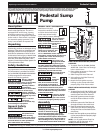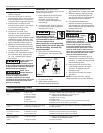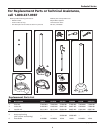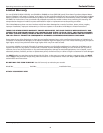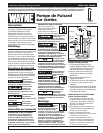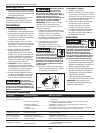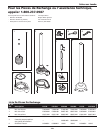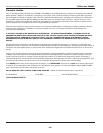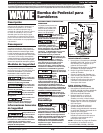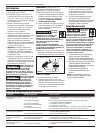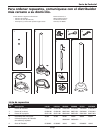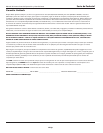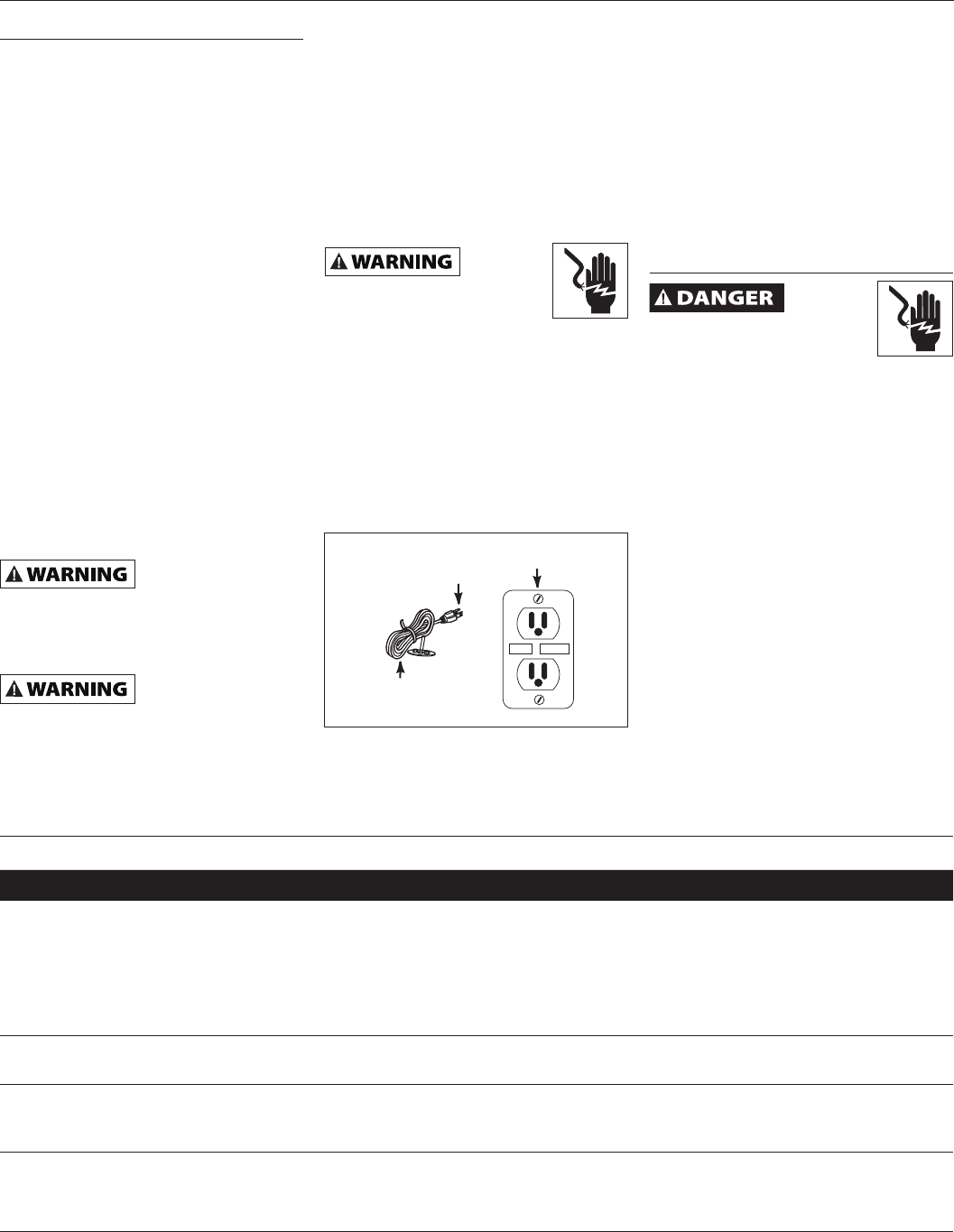
2
Operating Instructions and Parts Manual
www.waynepumps.com
so that the pump switches on with
approximately 14” of water in the sump.
3. While the pump is draining the pit,
verify that the discharge piping is
carrying the water to a point several
feet away from the foundation.
4. If the pump discharge line is
exposed to freezing temperature,
the exposed line must be pitched to
drain. Trapped water will freeze and
damage the pump.
Maintenance
Always
disconnect the electrical
supply before attempting to
install, service, relocate or
perform any maintenance. If the power
source is out of sight, lock and tag
in the open (off) position to prevent
unexpected power application. Failure
to do so could result in fatal electrical
shock. Only qualified electricians should
repair this unit. Improper repair could
result in fatal electrical shock.
1. Disassembly of the motor prior to
expiration of warranty will void the
warranty. If repairs are required, see
troubleshooting chart.
2. Keep pump inlet clean and free
of all foreign objects and inspect
annually. A clogged inlet will
damage pump.
3. Check pump monthly for proper
operation.
NOTE: A pump that has a tripped
thermal protector may start suddenly!
Installation
1. A ground fault circuit interrupter
(GFCI) is required.
2. This pump is for use on 120 Volt
(single phase), 60 hz, 15 amp service
and is equipped with a 3 conductor
cord and a 3 prong grounding plug.
3. Install pump in a sump pit with
minimum size as shown (See Figure
1). Construct sump pit of tile,
concrete, steel or plastic.
4. Locate unit on a solid, level
foundation. Do not place pump
directly on clay, earth, gravel or
sandy surface. These surfaces contain
small stones, gravel, sand, etc. that
may clog or damage the pump and
cause pump failure (See Figure 1).
5. (Optional) Thread check valve (not
included) into pump body carefully
to avoid stripping or cross threading.
Do not use pipe joint sealant.
6. Connect 1-1/4” rigid pipe to rubber
boot on check valve. Reverse boot
for 1-1/2” diameter pipe. Tighten
hose clamps.
Support pump and
piping when
assembling and after installation. Failure
to do so could cause piping to break, pump
to fail, etc. which could result in property
damage and/or personal injury.
Flood risk. If
flexible discharge
hose is used, make sure pump is
secured in sump pit to prevent
movement. Failure to secure pump
could allow pump movement and switch
interference and prevent pump from
starting or stopping.
IMPORTANT: Make sure there is
adequate room for float switch to move
freely during operation.
7. Protect electrical cord from sharp
objects, hot surfaces, oil and
chemicals. Avoid kinking the
cord and replace damaged cords
immediately.
8. A sump pit cover must be installed
to prevent debris from clogging or
damaging the pump.
Risk of
electrical
shock! This pump is supplied
with a grounding conductor
and grounding type attachment plug. Use
a grounded GFCI receptacle to reduce the
risk of fatal electrical shock.
Never cut off the round grounding
prong. Cutting the cord or plug will
void the warranty and make the
pump inoperable.
9. Insert the float switch cord plug
directly into a 120 volt outlet (See
Figure 2).
ADJUST AND T EST
1. Fill sump with water.
2. Adjust rubber grommet into a
permanent position on float rod
Troubleshooting Chart
Symptom Possible Cause(s) Corrective Action
Pump will not start or
run
1. Blown fuse
2. Low line voltage
3. Defective motor
4. Defective switch
5. Impeller
6. Float obstructed
1. If blown, replace with proper sized fuse or reset breaker
2. If voltage is under 108 volts, check wiring size
- DO NOT USE AN EXTENSION CORD
3. Replace motor or pump
4. Replace switch
5. If impeller will not turn, remove housing and remove blockage
6. Make sure float moves freely up and down
Pump start and stops too
often
1. Back flow of water from piping
2. Float out of adjustment
1. Install or replace check valve (Wayne check valve kit #66005-WYN1)
2. Adjust grommet
Pump will not shut off
or thermal protector
turns off
1. Defective switch
2. Obstacle in piping
3. Float obstructed
1. Replace switch
2. Remove pump and clean pump and piping
3. Make sure float moves freely up and down
Pump operates but
delivers little or no
water
1. Low line voltage
2. Plugged impeller
1. If voltage is under 108 volts, check wiring size
- DO NOT USE AN EXTENSION CORD
2. Clean out impeller
Grounding
Blade
Grounded
Outlet
Power
Cord
TEST
RESET
Figure 2
GFCI
Outlet



